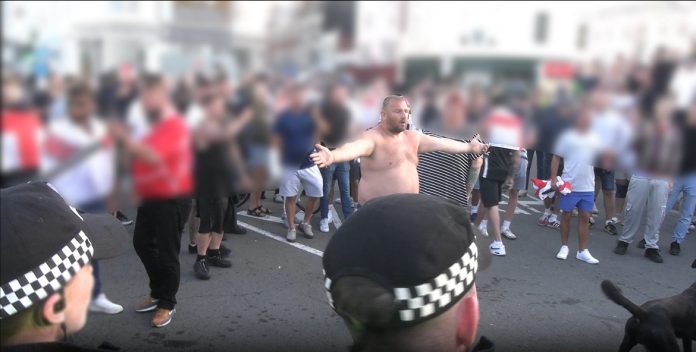More than two in five individuals arrested following last summer’s riots had previously been reported to the police for domestic abuse offences, The Guardian can reveal.
Data released under freedom of information (FoI) laws shows that 41% of the 899 people arrested during the violent disturbances in July and August 2024 had prior reports related to intimate partner violence. In one police force, that figure rose sharply to 68%.
These previous reports include serious offences such as actual and grievous bodily harm, stalking, coercive control, breaches of restraining or non-molestation orders, and criminal damage.
The findings emerge amid intensifying debate over the wave of anti-immigration protests outside asylum seeker accommodation. In Essex, police issued a dispersal order in Epping following repeated demonstrations outside the Bell Hotel, triggered by the arrest of an Ethiopian asylum seeker charged with sexual assault.
While ministers have acknowledged the public’s concerns as “legitimate”, far-right groups have played a prominent role in promoting and escalating the protests online and in person—sometimes resulting in direct clashes with police.
The riots, which erupted across the UK last summer, followed the murders of three young girls—Elsie Dot Stancombe, 7; Bebe King, 6; and Alice da Silva Aguiar, 9—during a Taylor Swift-themed dance class in Southport on 29 July. Axel Rudakubana, the man convicted of the killings, received a minimum sentence of 52 years in prison.
Between 30 July and 7 August 2024, at least 29 anti-immigration protests and riots broke out across 27 towns and cities in England and Northern Ireland. Many descended into violence, with demonstrators targeting mosques and hotels housing asylum seekers.
The Guardian obtained data from 21 police forces covering these affected areas, as identified in a House of Commons briefing last September.
In Bristol, of the 60 arrested, more than two-thirds had been previously reported for domestic abuse. Cleveland Police recorded 107 arrests in Hartlepool and Middlesbrough, 44 of whom had prior reports. South Yorkshire Police reported that 35 of the 75 arrested in Rotherham—where rioters set fire to an asylum hotel—had a history of domestic abuse.
In Sunderland, 91 people were arrested after cars, a building, and a mosque were set ablaze. Of these, 38 had previous domestic abuse reports. One of the arrested, Joshua Lane, a 27-year-old ex-serviceman, had previously received a suspended sentence for stalking, battery, and criminal damage. He later pleaded guilty to violent disorder.
Merseyside Police arrested 160 individuals following days of unrest in Liverpool and Southport but could not disclose how many had prior abuse reports due to cost constraints. However, one of their first arrests was made after a suspect in a domestic incident was recognised from riot footage.
In Hull, 47 of the 151 people arrested had previous domestic abuse reports. One man, Ethan Armstrong, 26, jailed for violent disorder, had a conviction for assaulting a former partner.
The Metropolitan Police confirmed 165 arrests in Whitehall during the unrest, 48 of whom had been reported for domestic abuse offences.
This data reveals a disturbing overlap between domestic abuse and public violence. Yet police records show that fewer than a quarter of those reported for domestic offences had ever been charged.
Isabella Lowenthal-Isaacs of Women’s Aid warned against viewing the violence as isolated incidents. “The truth is these events are symptomatic of deeper, connected issues—driven by the same forces of control, coercion, and misogyny that underpin domestic abuse and violence against women and girls.”
As of May 2025, the National Police Chiefs’ Council reported a total of 1,840 arrests linked to the riots, with 1,103 individuals charged—mainly with serious public order offences. Many of those charged came from the country’s most deprived areas.
Analysis of Crime Survey data confirms higher rates of domestic abuse in the areas affected—39 incidents per 1,000 people compared to a national average of 27.
One of the most volatile protests took place in Middlesbrough, where a peaceful vigil spiralled into a 1,000-strong riot. Rioters vandalised homes and vehicles and set up racially discriminatory ‘checkpoints’ for drivers.
A recent Home Affairs Committee report urged police to expand their monitoring of online platforms and recommended bold reforms to help fulfil the government’s pledge to halve violence against women and girls within a decade.
A Home Office spokesperson said: “The scale of violence and abuse suffered by women and girls in this country is nothing less than a national emergency. We are committed to halving such violence within 10 years, and will soon unveil a transformative strategy to meet that goal.”







